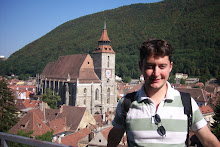

Life in a village has its own rhythm. And for every season there is another speed. Spring is advancing very fast. Three weeks ago it was still the end of winter; the start of this week felt as if summer was coming. Fresh lilacs are decorating my room. It makes it hard to grasp that it has been only one week since my arrival here.
One week with a lot of new experiences and small observations. Especially the latter ones I have to write down, before I’m taking things for granted. The 20 km long tram ride between Arad and the nearby town of Ghioroc for example, with the sign: forbidden to eat sunflower seeds. The fact that everyone greets each other on the streets. Some older people even get offended when it slips your mind. The omnipresent animals: chicken, ducks, geese, dogs, cows, sheep and horses. The local accent, in which n becomes nj. The fact that there are no street names, just numbers. And above all, the hospitality one may find even in places like the kindergarten, where they served us some traditional food and drinks.
Secondly, there are the small annoyances. Because they’re working here on a new water system, we don’t have running water during large parts of the day. Something typical for every small community is the social control. For us foreigners, it has limited itself so far to an occasional awkward look. The kindergarten teacher, who lives in another town, explained us on the other hand, how she experiences the judgment of the people.
Then there are the bizarre palaces in the village. Covăsânţ has a strong Roma community. Most of them are working abroad. With the money they earn over there, they build huge kitschy palaces in the village. One is bigger than the other. In most of them only one room is used. There seems to be a big difference with Suplacu. Here there is no obvious separation between Roma and Romanians. At least, children of both communities are attending the same school.

Last but not least we have the Big Invisible: politics. In June there will be the local elections. Behind the scenes the campaigns already have started. Everything turns out to be political, even in a village like this. And especially in a country like Romania, where a visible clash exists between old and new generations. Between people who prefer a status quo and people who want change. (To put it bluntly.) And if you want to get things done, you’ll have to be member of a political party. In this way, even the local youth center here is part of that game.

On the other hand: there is still at least one event bigger than the elections, and that is Orthodox Easter. The countdown for the 27th of April is running. Coming Sunday marks the start of the Holy Week, with every day a special sermon. The (holiday) week after Eastern is filled with all kind activities (tournaments) for the village youth. The summer weather might be useful then.





